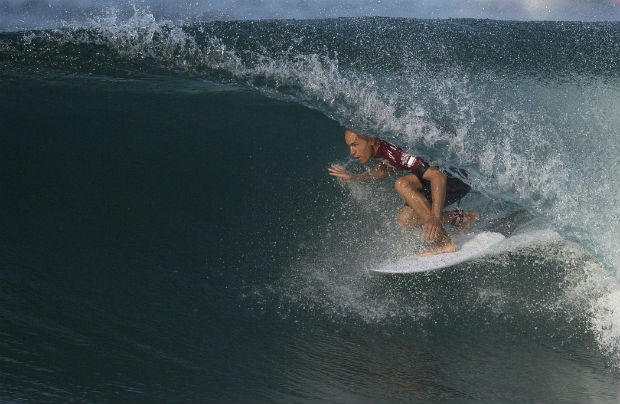
In this May 12, 2015 file photo, U.S. surfer Kelly Slater competes in the 2015 Oi Rio Pro World Surf League competition at Barra da Tijuca beach in Rio de Janeiro, Brazil. AP
RIO DE JANEIRO, Brazil—Rio’s sewage-filled waters are not only a problem for next year’s Olympics.
Organizers of Brazil’s stop on the World Surf League hope to move their event from a beach at Barra da Tijuca to a clean beach further west.
The Rio suburb of Barra da Tijuca is the main venue area for South America’s first Olympics. Though surfing isn’t an Olympic event, Rio’s water pollution is also causing health concerns for the sport.
“I hope we can put on some pressure to fix this pollution,” Rio event organizer Xandi Fontes told The Associated Press on Tuesday.
An independent study by AP published two months ago showed high viral levels from untreated sewage in all of Rio’s Olympic water venues, where 1,400 swimmers, rowers, sailors, canoeists and triathletes will compete next year.
READ: WHO and sailing body seek virus tests in Rio Olympic venues
The surfing area near the Olympic venue was not studied by AP, but a nearby lagoon abutting the new Olympic Park is severely polluted because of chaotic urban planning and a lack of public sanitation that stretches back decades.
During the World Surf League event in May, top surfers like American Kelly Slater complained openly about falling ill because of the contaminated water.
Fontes said that planning to move the event started only a month ago. He said permits are needed and there could be stumbling blocks using the beach called Grumari, which is located in a nature reserve.
Teco Padaratz, another Rio event organizer, was adamant about finding a better venue.
“Rio’s water pollution cannot go on like this,” he said. “Surfers love Rio. No one wants to leave. All they want is clean water.”
The World Surf League organizes 21 top competitions yearly—11 for men and 10 for women. It also runs dozens of junior events and special events.
Earlier this week, officials of the 2020 Tokyo Olympics proposed surfing, baseball and softball and several other sports for inclusion in the Japanese Games. The International Olympic Committee will announce the decision in Rio in August 2016.
READ: Rio head vows to introduce viral testing in Olympic waters
“I don’t recall another incident, at least in the last 10 years, where we’ve had an issue with water pollution,” WSL spokesman Dave Prodan told AP from the sport’s office in Los Angeles.
Prodan said a shark attack in July in South Africa forced officials to cancel a WSL event.
“If there is an issue, whether that’s sharks in South Africa or water pollution in Brazil, thesport pivots off the recommendations of the surfers,” Prodan said. “If the issue involves the health and safety of our athletes, we don’t have them out there.”
Rio Olympic organizers acknowledge it will be impossible to clean the area’s waters by the time the Games open in 10 months, a promise they made in winning the Olympic bid in 2009.
Officials will use stop-gap measures to retrieve floating rubbish from Guanabara Bay, the venue for sailing. But the viruses will remain.
The Switzerland-based International Olympic Committee has declined to endorse testing for viruses, which can cause stomach and respiratory ailments that could cost an athlete a gold medal.